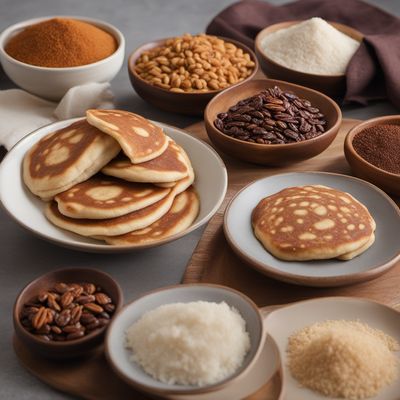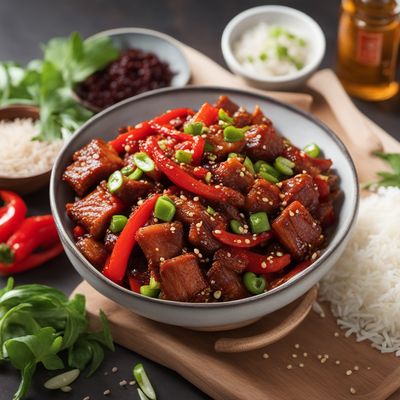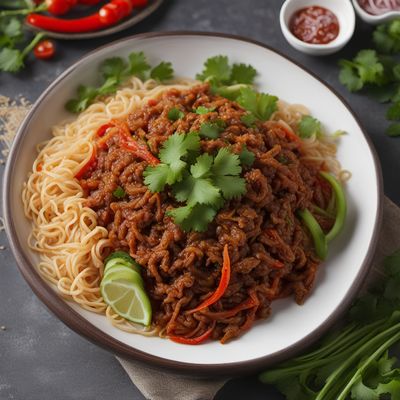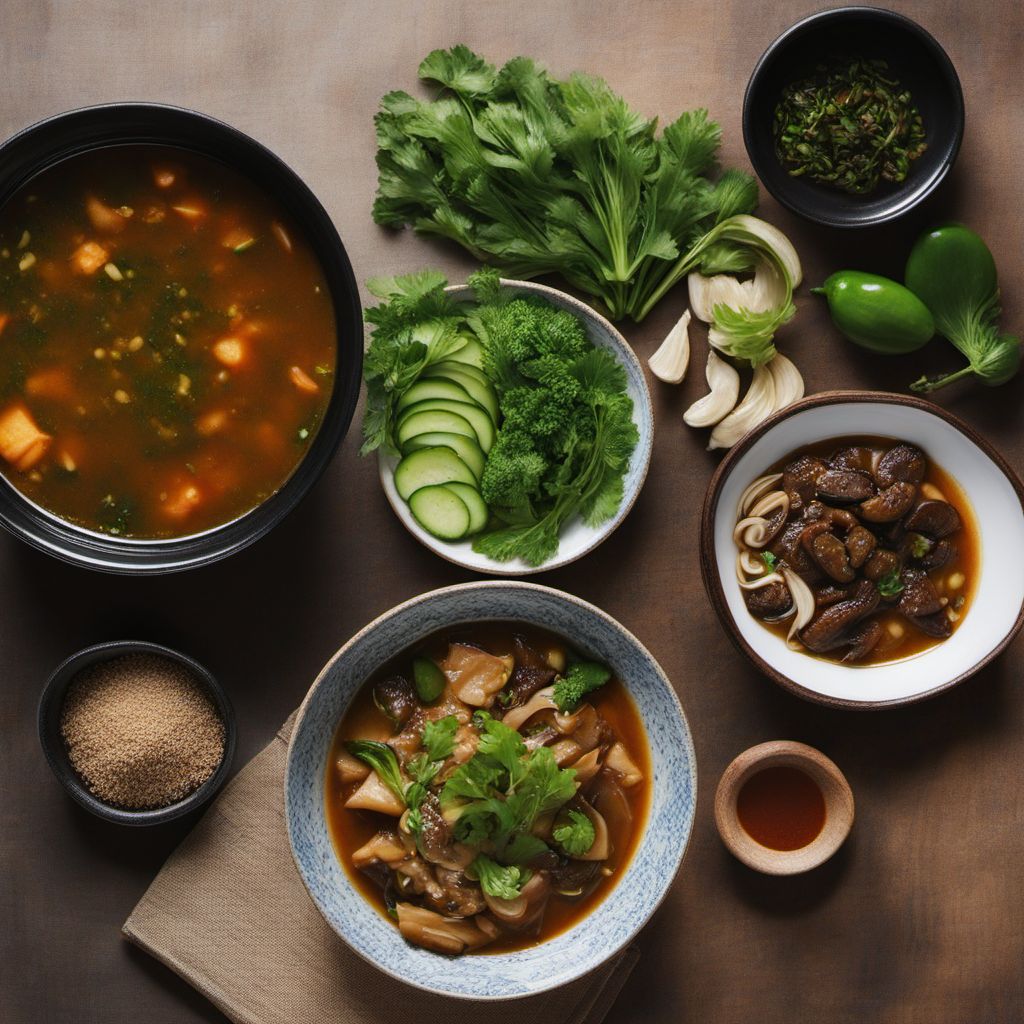
Recipe
Kodava Style Doenjang Jjigae
Hearty Kodava Doenjang Stew: A Fusion of Korean and Kodava Flavors
4.7 out of 5
This recipe combines the rich and savory flavors of Korean cuisine with the unique spices and ingredients of Kodava cuisine. Kodava Style Doenjang Jjigae is a comforting and nourishing stew that will transport you to the beautiful hills of Kodagu, while still capturing the essence of traditional Korean Doenjang Jjigae.
Metadata
Preparation time
15 minutes
Cooking time
25 minutes
Total time
40 minutes
Yields
4 servings
Preparation difficulty
Easy
Suitable for
Vegetarian, Vegan, Gluten-free, Dairy-free, Nut-free
Allergens
Soy
Not suitable for
Paleo, Keto, Low-carb, High-protein, Carnivorous
Ingredients
In this Kodava adaptation of Doenjang Jjigae, we incorporate the distinct flavors of Kodava cuisine by adding spices like black pepper and cardamom. These spices enhance the overall taste profile of the stew, giving it a unique Kodava twist. Additionally, we use locally available vegetables commonly used in Kodava cooking, such as zucchini, to further enhance the dish's Kodava identity. We alse have the original recipe for Doenjang jjigae, so you can check it out.
-
2 tablespoons (30ml) sesame oil 2 tablespoons (30ml) sesame oil
-
1 onion, thinly sliced 1 onion, thinly sliced
-
3 cloves of garlic, minced 3 cloves of garlic, minced
-
1-inch piece of ginger, grated 1-inch piece of ginger, grated
-
1 zucchini, sliced 1 zucchini, sliced
-
5-6 button mushrooms, sliced 5-6 button mushrooms, sliced
-
2 tablespoons (30ml) Doenjang paste 2 tablespoons (30ml) Doenjang paste
-
4 cups (950ml) vegetable broth 4 cups (950ml) vegetable broth
-
1 teaspoon black pepper 1 teaspoon black pepper
-
1 teaspoon cardamom powder 1 teaspoon cardamom powder
-
1 tablespoon (15ml) soy sauce 1 tablespoon (15ml) soy sauce
-
1 tablespoon (15ml) rice vinegar 1 tablespoon (15ml) rice vinegar
-
1 tablespoon (15ml) maple syrup 1 tablespoon (15ml) maple syrup
-
2 green onions, chopped 2 green onions, chopped
-
Fresh cilantro, for garnish Fresh cilantro, for garnish
Nutrition
- Calories (kcal / KJ): 180 kcal / 753 KJ
- Fat (total, saturated): 8g, 1g
- Carbohydrates (total, sugars): 22g, 10g
- Protein: 6g
- Fiber: 4g
- Salt: 1.5g
Preparation
-
1.Heat sesame oil in a large pot over medium heat.
-
2.Add the sliced onion and sauté until translucent.
-
3.Stir in the minced garlic and grated ginger, and cook for another minute.
-
4.Add the sliced zucchini and mushrooms to the pot, and cook until they start to soften.
-
5.In a small bowl, whisk together the Doenjang paste, vegetable broth, black pepper, cardamom powder, soy sauce, rice vinegar, and maple syrup.
-
6.Pour the mixture into the pot and bring to a simmer.
-
7.Reduce the heat to low and let the stew simmer for about 15-20 minutes, allowing the flavors to meld together.
-
8.Stir in the chopped green onions and cook for an additional 2 minutes.
-
9.Remove from heat and garnish with fresh cilantro.
-
10.Serve hot with steamed rice or crusty bread.
Treat your ingredients with care...
- Doenjang paste — Make sure to use authentic Korean Doenjang paste for the best flavor. If unavailable, you can substitute with miso paste, although the taste will be slightly different.
Tips & Tricks
- For a spicier version, add a teaspoon of Korean chili flakes (gochugaru) to the stew.
- Feel free to customize the vegetables based on your preference and seasonal availability.
- Adjust the seasoning according to your taste by adding more soy sauce or maple syrup if desired.
- Leftovers can be refrigerated and enjoyed the next day, as the flavors tend to deepen and develop further.
Serving advice
Serve the Kodava Style Doenjang Jjigae hot in individual bowls, accompanied by steamed rice or crusty bread. Garnish with fresh cilantro for a pop of color and added freshness.
Presentation advice
Present the Kodava Style Doenjang Jjigae in rustic earthenware bowls to evoke a sense of traditional Kodava dining. Pair it with a side of steamed rice or crusty bread, and garnish with a sprig of fresh cilantro for an appealing visual contrast.
More recipes...
For Doenjang jjigae
For Korean cuisine » Browse all
More Korean cuisine dishes » Browse all

Seolleongtang
Ox bone soup
Seolleongtang is a traditional Korean soup made from ox bones, brisket and other cuts. It is a hearty and comforting dish that is often enjoyed...
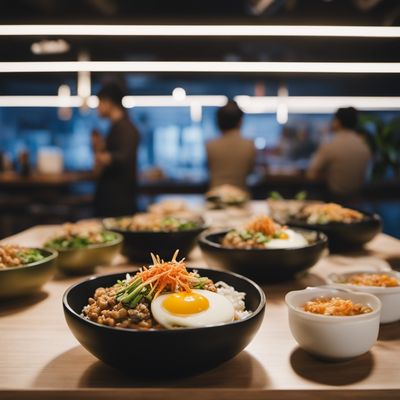
Dububap
Dububap is a traditional Korean dish made with rice, beans, and vegetables. It is usually served as a main course.
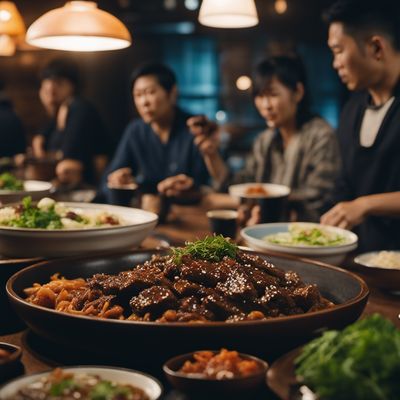
Jangjorim
Soy-braised beef
Jangjorim is a traditional Korean dish that is made with beef and soy sauce. It is a popular side dish that is often served with rice or used as a...


